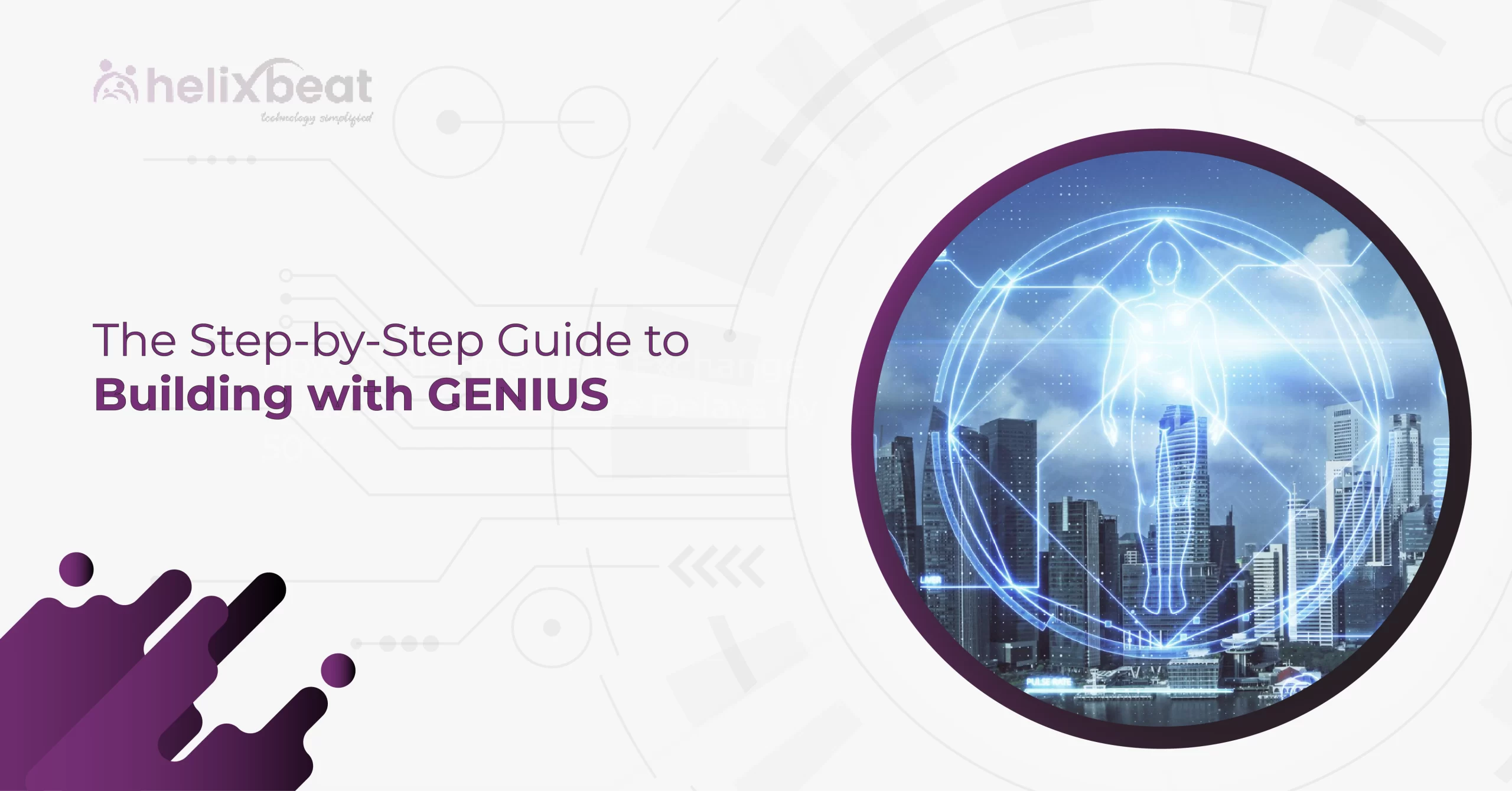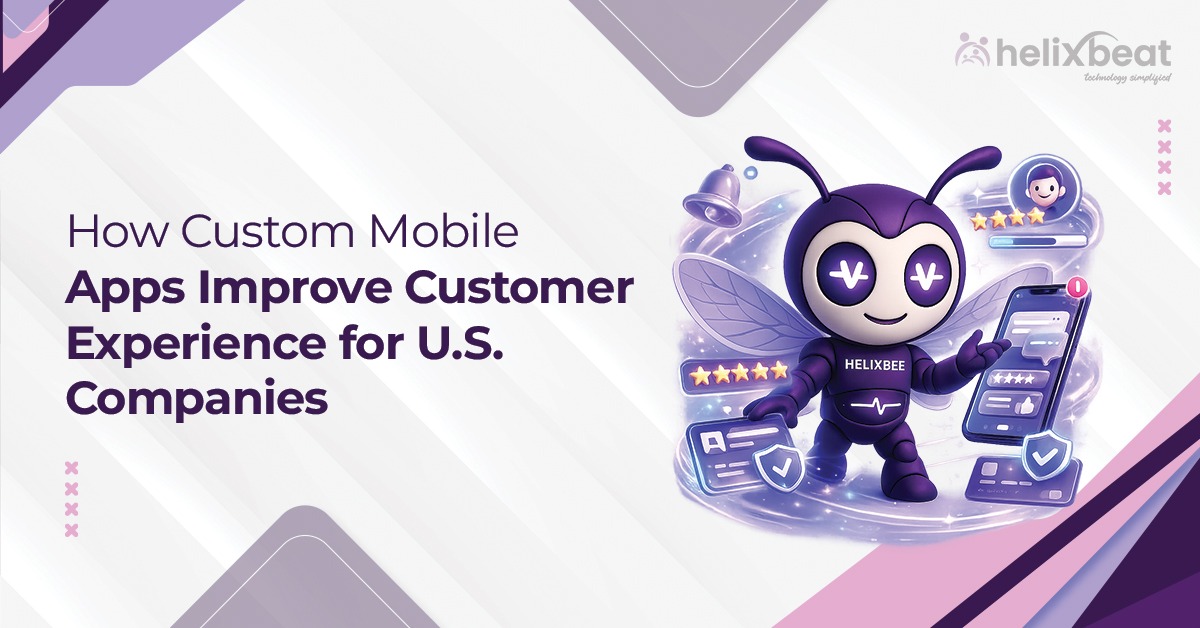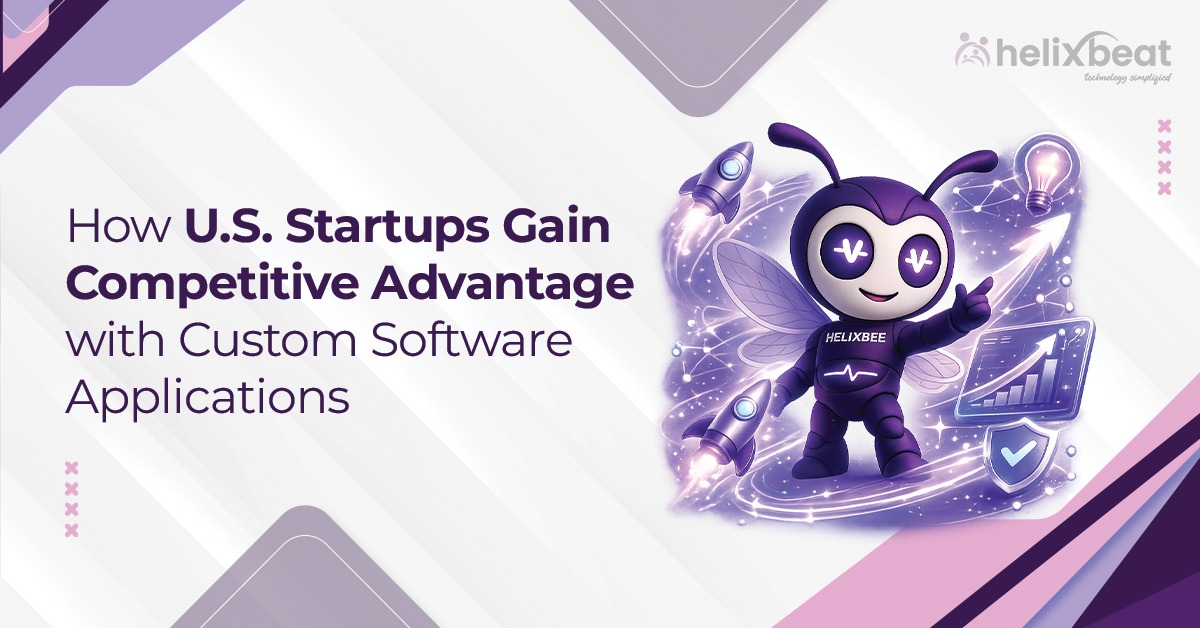Healthcare systems worldwide struggle with fragmented operations, leading to inefficiencies, errors, and rising costs. This is where GENIUS makes a difference—a unified platform designed to integrate, standardize, and secure healthcare data. GENIUS empowers developers to build cutting-edge healthcare solutions with ease, efficiency, and flexibility. This detailed guide will show you how to utilize GENIUS’s tools and APIs to create transformative solutions.
Table of Contents
What is GENIUS?
GENIUS is an innovative platform that integrates the capabilities of three advanced tools—AERIS, FUSION, and PULSE—designed to address key challenges in healthcare such as interoperability, workflow inefficiencies, and data security. These tools serve as foundational building blocks for developers, enabling them to explore, evaluate, and implement robust solutions tailored to the complex demands of healthcare systems.
AERIS facilitates secure real-time data exchange, FUSION standardizes data for seamless integration, and PULSE ensures tamper-proof record-keeping. Together, they empower developers to create scalable, compliant, and secure healthcare applications that meet the evolving needs of the industry.
Step-by-Step Guide to Building with GENIUS
GENIUS offers developers a comprehensive platform to build secure, scalable, and efficient healthcare solutions. This guide provides a detailed step-by-step approach to leveraging GENIUS’s capabilities for seamless development.
Step 1: Setting Up Your Development Environment
Before starting your development journey, it’s important to prepare your environment for smooth integration with GENIUS’s tools. Proper setup ensures you can leverage all platform features effectively.
Actions to Take
- Register on the GENIUS Platform: Begin by creating an account to gain access to essential resources, including API documentation, sandbox environments, and monitoring tools.
- Generate API Keys: Securely generate and store your credentials to interact with GENIUS services. These keys are essential for accessing the platform’s functionalities.
- Choose Your Development Stack: GENIUS supports multiple programming languages, such as Python, Java, and C#, offering flexibility for developers to use their preferred technology stack.
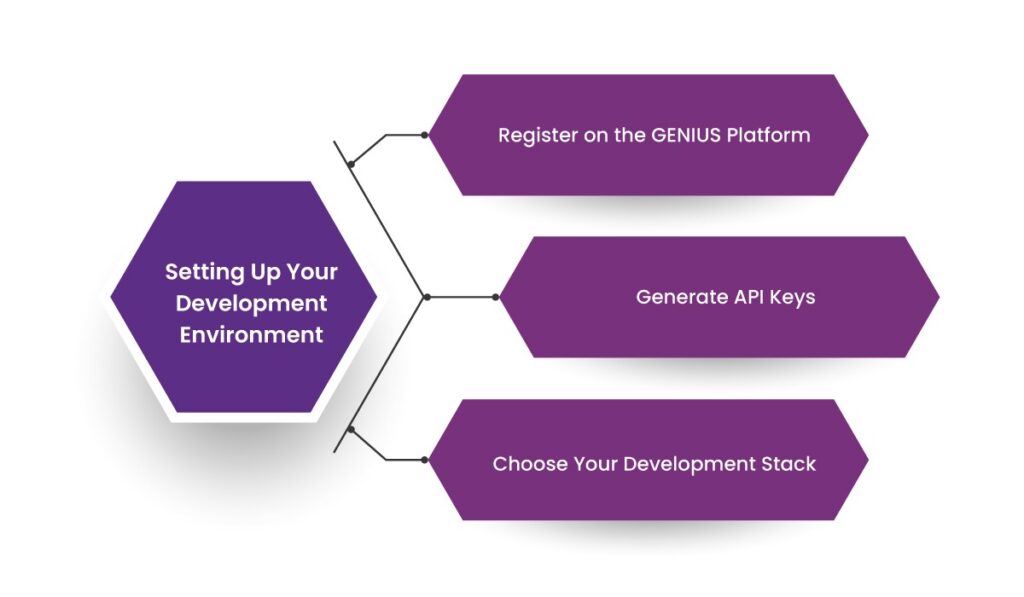
Pro Tip
Explore GENIUS’s detailed documentation to understand API endpoints, workflows, and best practices, ensuring a strong foundation for development.
Step 2: Exploring the GENIUS Sandbox
The sandbox environment is a critical resource for testing and refining your applications without affecting live systems. It allows developers to experiment with GENIUS tools in a risk-free space.
How to Use the Sandbox
- Test workflows and integrations for AERIS, FUSION, and PULSE to ensure functionality and performance.
- Simulate real-world scenarios, such as secure data exchanges between systems or tamper-proof recordkeeping.
- Debug and refine your workflows to identify and address potential issues before live deployment.
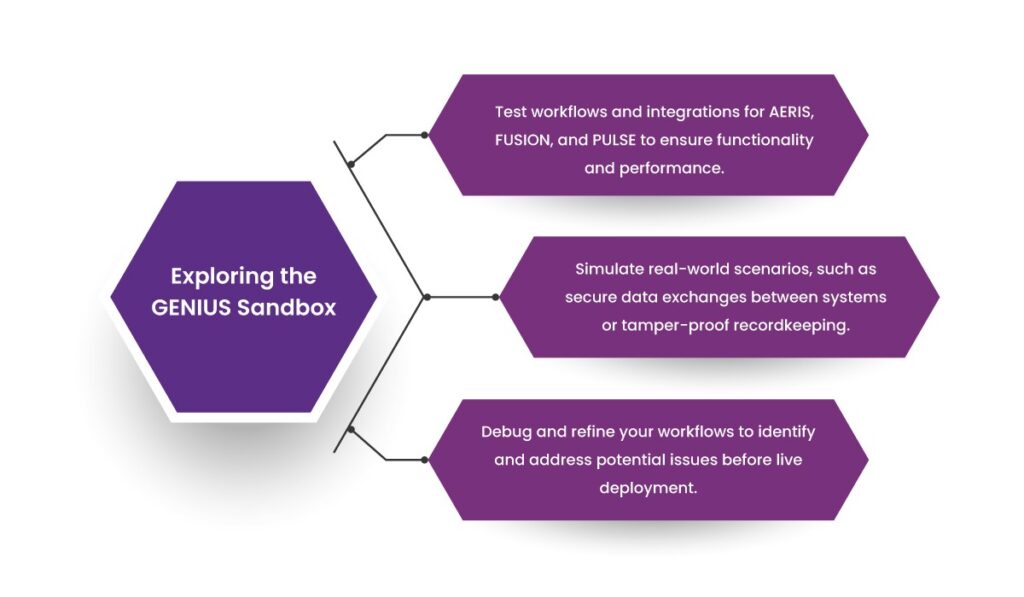
By utilizing the sandbox effectively, you can build confidence in your application’s performance and security.
Step 3: Leveraging AERIS for Real-Time Connectivity
AERIS is designed to streamline data exchange and eliminate inefficiencies in communication between healthcare systems. It supports real-time collaboration, improving operational workflows across departments and organizations.
Key Features of AERIS
- Workflow Automation: Automates data-sharing processes, reducing manual intervention and improving efficiency.
- Real-Time Dashboards: Enables visualization of performance metrics by connecting operational databases and analytics systems.
- Supply Chain Optimization: Synchronizes inventory and order data to prevent manual tracking errors and enhance resource management.
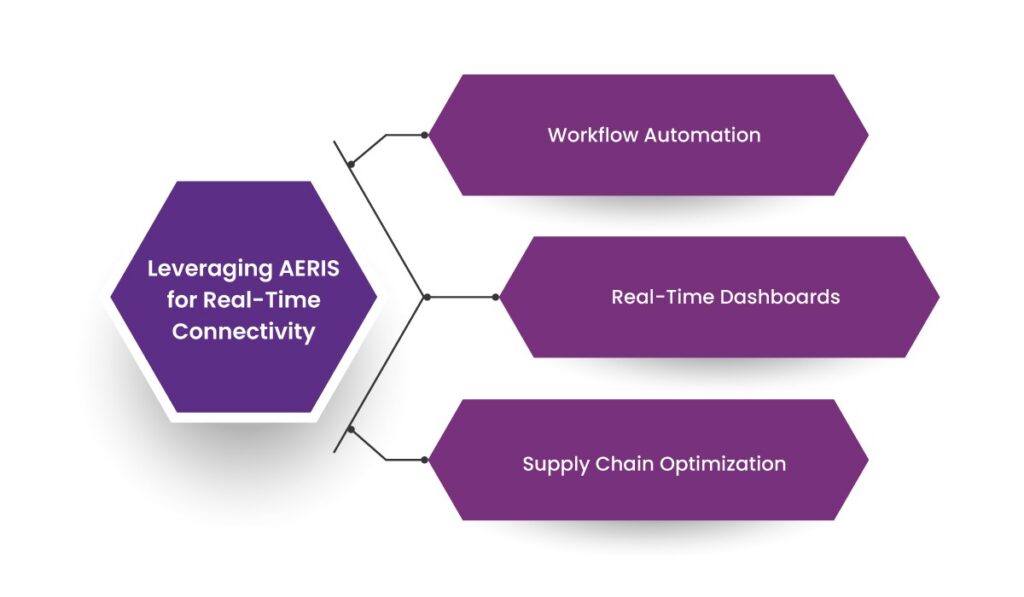
Developer Best Practices
Start small by automating a single workflow, allowing you to test the integration and scalability of AERIS. Use built-in monitoring tools to track data flow and optimize for better performance.
Step 4: Using FUSION for Data Standardization
FUSION addresses the critical issue of interoperability by standardizing data formats across diverse healthcare systems. This ensures seamless collaboration between different platforms, improving overall efficiency and reducing errors.
How FUSION Works?
- Integrating EHR Systems: FUSION connects disparate systems to create unified patient records, enabling comprehensive healthcare delivery.
- Standardizing Lab Results: It converts diverse lab data into standardized formats like FHIR, ensuring consistency and accuracy.
- Streamlined Referrals: Ensures specialists receive accurate, error-free patient histories, facilitating better care coordination.
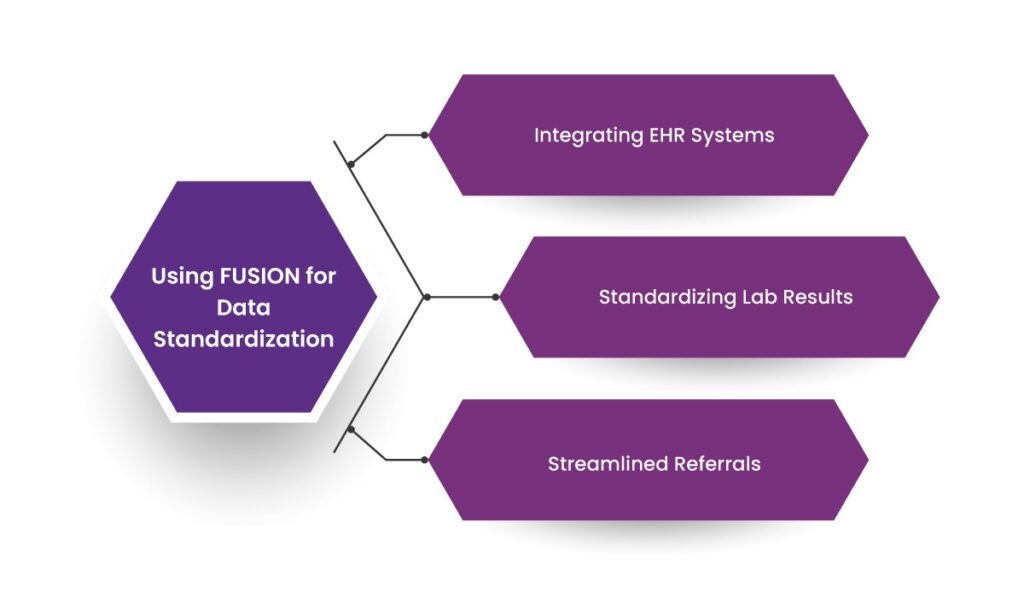
Developer Insights
Leverage FUSION’s validation capabilities to ensure compliance with standards such as HL7 and FHIR. Regularly update workflows to align with evolving healthcare regulations and standards.
Step 5: Securing Data with PULSE
PULSE is designed to provide tamper-proof recordkeeping, a critical feature for ensuring trust and compliance in healthcare systems. It safeguards sensitive data, simplifies processes, and enhances patient engagement.
Features of PULSE
- Immutable Recordkeeping: Ensures that patient records remain unaltered, reducing disputes and maintaining data integrity.
- Patient Portals: Provides patients with secure access to their records, enabling them to manage appointments, view updates, and communicate with healthcare providers.
- Automated Scheduling: Reduces administrative burdens by automating reminders and managing appointments efficiently.
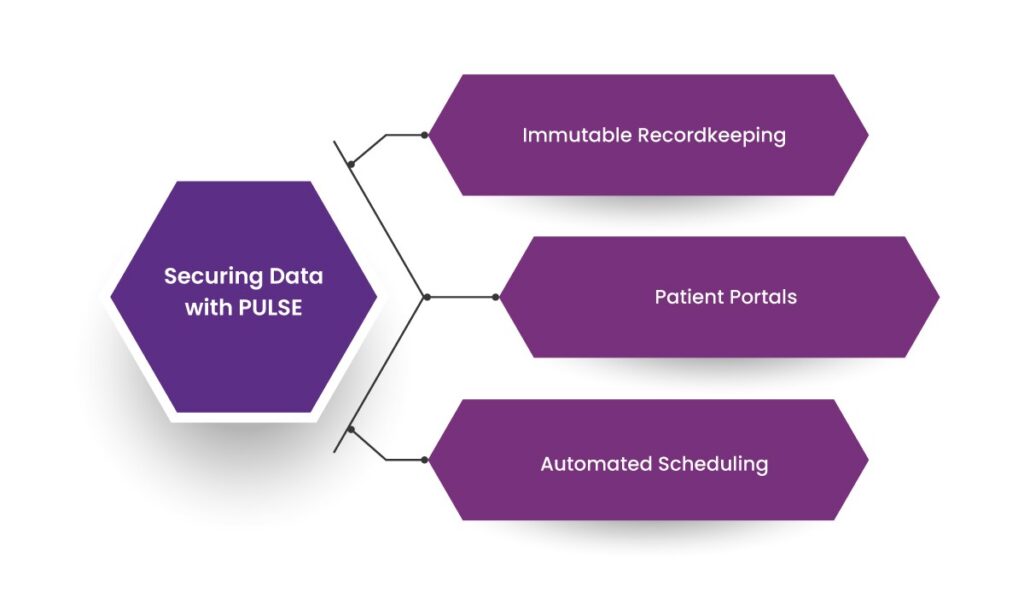
Security Best Practices
Implement multi-factor authentication for patient portals and use role-based permissions to control access to sensitive information. These practices enhance security and protect patient privacy.
Step 6: Testing and Monitoring Your Solution
Rigorous testing and monitoring are essential to ensure your application performs well under real-world conditions. GENIUS provides tools and resources to validate and optimize your solution.
Testing Tips
- Simulate heavy data loads in the sandbox environment to identify potential bottlenecks.
- Conduct stress tests to evaluate the system’s performance under various conditions.
- Validate data integrity using the built-in tools provided by GENIUS.
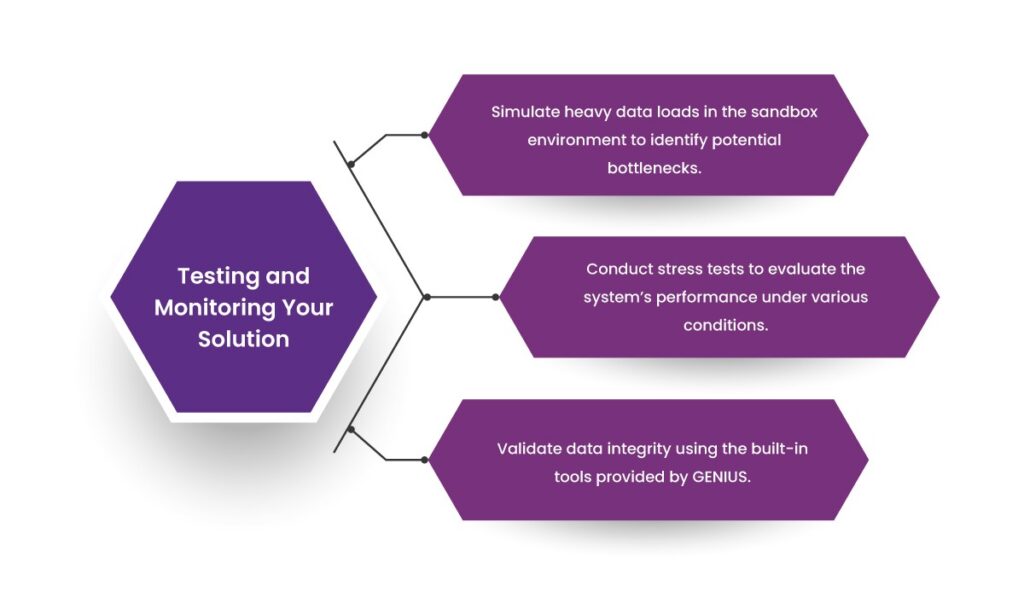
Monitoring Tools
The GENIUS dashboard offers real-time insights into API performance, error rates, and workflow efficiency. Use this data to optimize processes, enhance scalability, and ensure consistent performance.
GENIUS empowers developers with the tools and resources needed to create secure, compliant, and scalable healthcare solutions. By following this step-by-step guide, you can effectively integrate GENIUS’s advanced features into your applications, ensuring they meet the dynamic needs of the healthcare industry. From real-time connectivity with AERIS to data standardization with FUSION and secure recordkeeping with PULSE, GENIUS provides a comprehensive platform for innovation and trust in healthcare development.
GENIUS’s Ease of Use and Flexibility
GENIUS is designed with developers in mind, offering a user-friendly platform that simplifies the complexities of healthcare app development. Its plug-and-play integration ensures that developers can seamlessly incorporate GENIUS’s features into their applications without extensive system overhauls.
The platform’s detailed documentation provides step-by-step guidance, allowing developers to quickly navigate API functionalities and implement secure, efficient workflows. This streamlined approach reduces development time and minimizes the potential for errors, enabling faster deployment of reliable solutions.
Why Choose GENIUS?
Scalability
GENIUS supports solutions that scale effortlessly to meet the evolving needs of healthcare organizations. Whether serving a small clinic or a large hospital network, the platform adapts to varying levels of complexity and data volume without compromising performance.
Cost-Effectiveness
By automating processes, reducing inefficiencies, and minimizing errors, GENIUS helps healthcare providers save between $3,000 and $5,000 per patient annually. These savings contribute to both operational efficiency and improved patient outcomes.
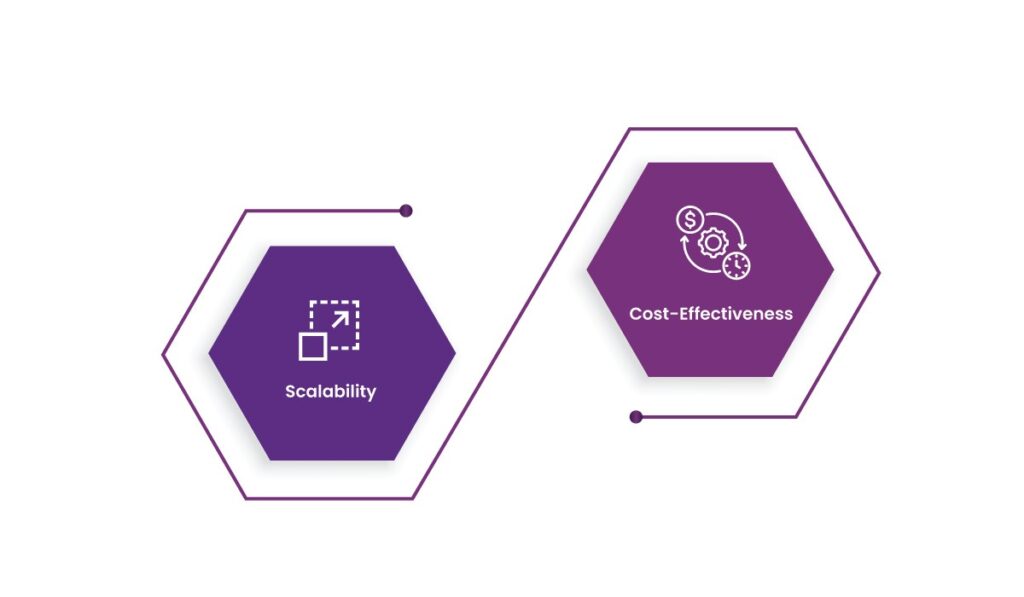
Future-Ready Capabilities
GENIUS is built to support emerging technologies such as AI and IoT, ensuring that applications developed today remain relevant and adaptable for future advancements in healthcare.
With its focus on ease of use, flexibility, and robust features, GENIUS empowers developers to create secure, scalable, and cost-efficient healthcare solutions.
FAQs
Final Words
GENIUS is more than a platform—it’s a comprehensive toolkit that empowers developers to revolutionize healthcare. By leveraging AERIS, FUSION, and PULSE, you can build efficient, secure, and interoperable systems tailored to today’s challenges and tomorrow’s innovations. Ready to transform the future of healthcare? Start building with GENIUS today.
What is GENIUS, and how does it help developers?
GENIUS is a platform showcasing tools like AERIS, FUSION, and PULSE that simplify interoperability, improve data security, and optimize healthcare workflows.
How do I start using GENIUS APIs?
Register on the platform, generate API keys, and use the sandbox to test and build your integrations.
What programming languages does GENIUS support?
GENIUS supports Python, Java, and C#, providing flexibility for developers.
How does AERIS enhance operational efficiency?
AERIS automates workflows, reduces errors, and enables real-time data sharing, cutting processing times by 50%.
What standards does FUSION use for interoperability?
FUSION uses HL7 and FHIR standards to ensure seamless data exchange.
How does PULSE ensure data security?
PULSE creates tamper-proof records, provides role-based access, and uses encryption to safeguard data.
Can GENIUS integrate with existing healthcare systems?
Yes, GENIUS is designed for plug-and-play integration with minimal disruption to existing systems.
What kind of support does GENIUS offer for developers?
GENIUS provides comprehensive documentation, sandbox environments, and real-time monitoring tools.
How does GENIUS save costs for healthcare providers?
By reducing errors, standardizing data, and streamlining workflows, GENIUS saves $3,000–$5,000 per patient annually.
Is GENIUS suitable for small healthcare providers?
Yes, GENIUS’s scalable tools cater to the needs of both small and large healthcare organizations.



